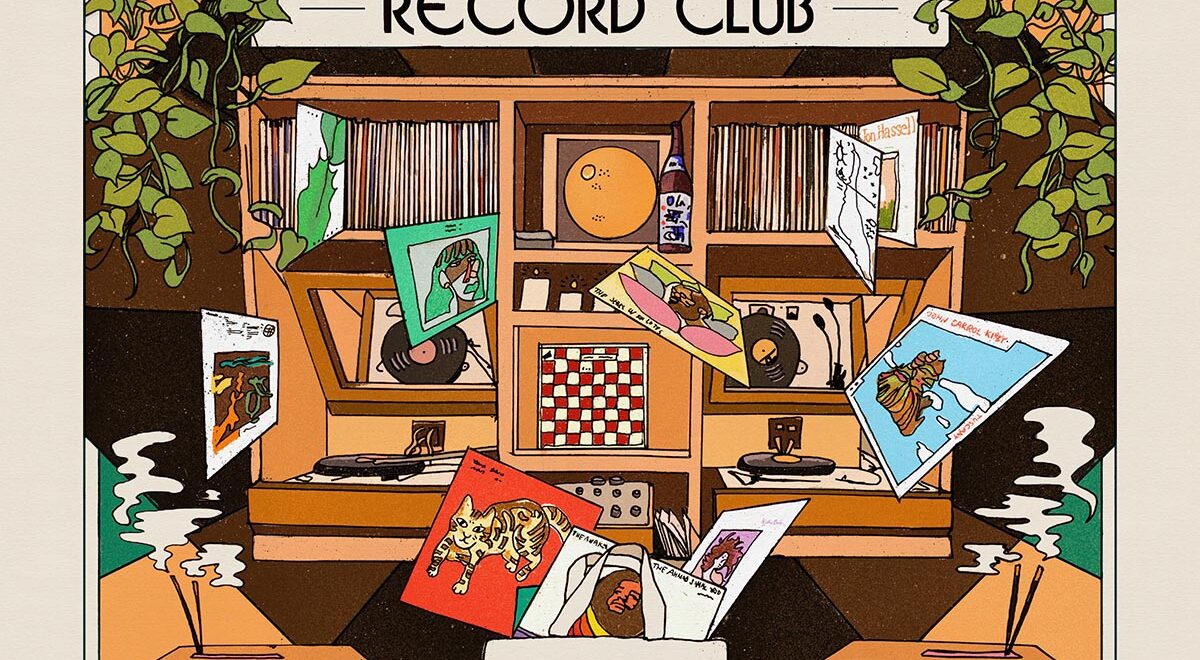The summer is halfway over and you’ve been scrolling for like, what, six weeks straight now? Step away from your phone (after reading this, of course). An analog […]
Deep dive: Getting lost in Stereolab’s Emperor Tomato Ketchup

If you’ve never done so or it’s been a while, you should cue up “Metronomic Underground,” the opening track on Stereolab’s Emperor Tomato Ketchup. Released in March, 1996, the record marked the groop’s first Great Leap Forward from mesmerizing space-rock band (and borrower of Krautrock riffs) to wildly experimental pop band.
One of the great opening songs, “Metronomic Underground” eases in with a series of eight-measure runs that create and expand on a simple theme. Propelled by a breakbeat-adjacent rhythm, weird sounds abound. What sounds like a turntable scratch might be the bending and unbending of some pliable sheet; the bass-line enters a half-step early, making the whole thing a little wobbly and decidedly non-metronomic; the Vox and Farfisa organs drone and drone and drone and drone.
Whole chapters could be written about “Metronomic Underground,” though successfully cracking the lyrical code might be tough:
Crazy, sturdy, a torpedo
Crazy, sturdy, a torpedo
Crazy, sturdy, a torpedo
Crazy, sturdy, a torpedo
Crazy, brutal, a torpedo
Crazy, sturdy, a torpedo.
Your guess is as good as ours.

The album’s title is equally confounding, a non sequitur trio of words borrowed from a 1970 experimental film by Japanese auteur Shuji Terayama. The film, according to Sleek magazine, “shocked audiences for its audacious storyline involving a group of children planning to overthrow dictating adults in a largely improvised production.” A still from the film is above. Note the actress’s makeup, which Stereolab’s Laetitia Sadier mimics in the videos for ‘Cybele’s Reverie’ and ‘The Noise of Carpet.’
Those in the New York area can feel the entire weight of Emperor Tomato Ketchup (ETK) when we cue it up as part of our weekly dedicated listening session. Occurring this week on Tuesday (we’re closed for Yom Kippur on Monday), the session focuses on indie classics from the 1990s. In addition to Stereolab, we’ll be playing at a very respectable volume album sides by Hydroplane, Duster, Broadcast, Anna Domino, and others. (See below for selections.)
Here’s how Simon Reynolds described ETK upon its release:
Emperor Tomato Ketchup marks a significant break with the Neu! meets Gallic E-Z listening formula that has sustained Stereolab so well over the seven (Jesus, is it really that many? Yes) preceding albums. The motorik beat, the Sean O’ Hagan string arrangements, the dulcet harmonies of Laetitia Sadier and Mary Hansen, are still present. What’s new, though, is that much of Emperor is almost funky. Apparently, Tim Gane wrote most of the songs starting from basslines, as opposed to two-note guitar chords (his previous modus operandi), and he’s been listening closely to the riffs and percussion ideas of Sun Ra, Don Cherry, and Yoko Ono/Plastic Ono Band circa Fly. And so Emperor was conceived as an exercise in swing, almost a big band thang.
That the record was conceived as a major label project for the Warner Bros. subsidiary Elektra Records, home at various points to artists including Tim Buckley, the Doors, Missy Elliott, Björk, the Stooges, Bread, and Television, is worth noting. Though never aiming for the commercial pop charts, Stereolab at the time was certainly gunning to be commercial-adjacent – at least enough to pay the bills. It was coproduced by Tortoise’s John McIntire, and partially recorded at his Soma studio in Chicago.
Beneath the mesmerizing Stereolabian mantras on ETK were lyrics drawn from philosophical and social science writings. The album’s closing track, ‘Anonymous Collective,’ referenced a phrase by Greek philosopher Cornelius Castoriadis, who was obsessed with individual and collective autonomy and argued that traditional forms of collective organization have failed by stifling individual creativity. The “anonymous collective” was his way of reconciling autonomy with collective action. Minus this footnote, though, it’s impossible to make the connection when Sadier, in her deepest, richest contralto, sings:
You and me are molded by things
Well beyond our acknowledgment.
In a late 1990s interview writer Carsten Wohlfeld asked band cofounder Tim Gane about Stereolab’s output, which at the time also included brilliant independent releases on its own Duophonic label.
Wohlfeld: How do you decide whether a song or session will be used for a major label album (outside of the UK Stereolab are signed to Elektra / Eastwest) or for one of your many independent releases on the side?
Gane: When we record an album for Elektra, it is ‘the next album’ and we use the advance that they give us. The other records that we make we record with our own money and Elektra doesn’t have anything to do with them. They couldn’t even release that many records anyway, they are far too big.
Wohlfeld: New to the ranks of your “little helpers” in the studio is Jim O’Rourke. How did you get involved with him?
Gane: All the people we work with are our friends first before we work with them. To play with friends is just more fun. A lot of them are people we admired at first and who later became our friends. We wanted to work with Jim for a long time, but he’s very busy these days. He produced one half of the record, John [McEntire] the other. And usually the audience doesn’t know who produced what. We had that before, with Emperor Tomato Ketchup. People said: “You can really hear John’s influence of ‘Metronomic Underground’ – this funky Tortoise-sound.” And we could just answer: “No, we already recorded that song before we even went to Chicago to work with John.” The same happened with Dots And Loops, where Mouse On Mars produced a few tracks. It think it’s pretty funny though to see people guessing.
Emperor Tomato Ketchup came out in March, and was the beginning of a busy year for the band. A month prior, they teased the album’s release with the Cybele’s Reverie EP, which also featured three other tracks: a different arrangement of “Les Yper-Yper Sound” and two non-album songs, “Brigitte” and “Young Lungs.”
Six months after ETK came put, they issued Fluorescences, a 25-minute Duophonic EP whose highlight is the relentless 13-plus minute jam ‘Soop Groove #1.’ Built on loping rhythm that goes on and on and on, it’s the closest the band has ever come to a free-jazz workout.
Less than a year later, Stereolab teamed with Nurse with Wound to issue the Duophonic single ‘Simple Headphone Mind’/’Trippin’ with the Birds.’
Named after the song by Krautrock group Alcatraz, ‘Simple Headphone Mind’ was produced by the band sending its track to Nurse With Wound’s Steven Stapleton to finish. The result is a stereophonic wonder, one expertly produced to mess with your mind through ridiculous headphone pans and fades and phasing.
The band revels in such stereophonic antics, which is another reason why you need to hear it in a focused, high-volume environment.
Hear’s the menu for Tuesday’s dedicated listening session at ISC NYC.
Anna Domino – East and West
Hydroplane – Hydroplane
The Shapiros – Gone by Fall
The Cat’s Miaow – Songs ’94-’98
Duster – Stratosphere
Bowery Electric – Beat
Broadcast – Haha Sound
Stereolab – Emperor Tomato Ketchup
When:
Tuesday, Sept. 26, 2-5 pm.
Where:
In Sheep’s Clothing NYC
Enter on King, 350 Hudson St, New York, NY 10014










